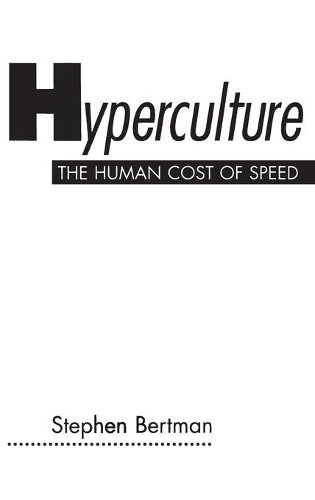
Hyperculture: The Human Cost of Speed
(Hardback)
Publishing Details
Hyperculture: The Human Cost of Speed
By (Author) Stephen Bertman
Bloomsbury Publishing PLC
Praeger Publishers Inc
30th April 1998
United States
Classifications
Tertiary Education
Non Fiction
Cultural studies
303.4
Physical Properties
Hardback
288
Width 156mm, Height 235mm
539g
Description
The rampant illnesses of our society - including the disintegration of the family, the degradation of the environment, unlimited commercialism and unrelenting stress - are familiar to us all. Stephen Bertman attempts to explain these disparate, overwhelmingly negative phenomena with a single, unifying principle: that the accelerated pace of American society is eroding the essence of our most fundamental values. In 1970, Avlin Toffler identified a psychobiological disease he called "future shock" caused by "too much change in too short a time". Now Bertman diagnoses an even more serious condition, "hyperculture", chronic warping of morals and ethics caused by America's addiction to speed. The treatment, he argues in this book, will require nothing less than a drastic slowdown - we must reassert control over the technologies that now dominate us in order to insure a humane future for our children and ourselves. We live, according to Bertman, in a society ruled by "power of now", a power that gives us instant gratification even as it demands our instantaneous obedience. As a result, we have adapted our lives and values to match the speed-of-light electronic technologies that surround us. But, in so doing, we have paid a high price in spirit and mind. Cut off from the widsom of the past and too rushed to consider the consequences of our actions, we are caught up in a culture of sensationalism and transience in which the very definitions of personal identity and democracy are being transformed. Hyperculture dares to suggest that the cure for our condition lies not in an "information superhighway" or "third wave information revolution", but in the radical and painful process of decelerating our lives enough to reclaim them. It is a daunting challenge, to be sure, but one on which our happiness and even our survival depend.
Reviews
There is erudition, an excellent bibliography, and much food for thought in this book, and it does resonate with problems in American society. * Choice *
The book is easy to read and has a broad sweep. . . . Students and thoughful psychologists interested in communication, stresses related to time pressure, cultural change, and the effects of technology on human behavior and cognition should find useful ideas here. * Perceptual and Motor Skills *
Impressive in its command of details and description, this book accurately describes the revolutionary social changes wrought by modern culture, and especially the instantaneous culture of electonic communication. * Time's News *
Bertman weaves a critical, compelling, and most significant for the sociologist, multi-level analytic argument about the human dimensions of living an accelerated life. He offers insightful, thoughtful, and conservative strategies for restraining our technology, retaining our history, and regaining our senses. This book could be used as a supplemental reading in Introductory Sociology or Social Problems courses that have a social change orientation. This book could also be easily integrated into courses such as American Society, Social Movements, Technology and Society, Social Change, and Social Theory and portions could be integrated into Family or Social Psychology courses. * The Great Plains Sociologist *
Author Bio
Stephen Bertman, PhD, is professor of Classical and Modern Languages, Literatures, and Civilizations at Canada's University of Windsor. He is the author of Art and the Romans (1975), The Conflict of Generations in Ancient Greece and Rome (1976), Doorways Through Time: The Romance of Archaeology (1986), and the forthcoming Cultural Amnesia (Praeger). An educational consultant and nationally recognized speaker, he resides in West Bloomfield, Michigan.
